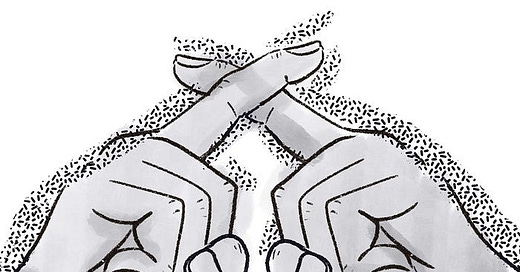Hi friends! I’ve noticed that with the sheer amount of news and intensity, my newsletters have increased both their frequency and length lately. And with all the “unprecedented events” in the news competing for your attention, I thought I would just tell a quick story that I think is important.
When I worked at The Center in Hollywood, our only qualification to come in and get coffee was that you had to be safe that day. (I’ve reflected more on this here if you’re intersted.) While I advocate for this framework and still practice it, there is room for ever. Because it requires making judgment calls in the moment based on reactions, vibes, and intuition, which leaves the door for bias and misjudgment.
Before we opened each morning, a small crowd would form around our gate, and every once in a while an incident would happen there that would prevent us from allowing one or more folks in that day. On this particular morning, a guy who went by Animal was coming down the street towards us in a verbal altercation with the police. Animal had a reputation for having a short temper on the streets, but had always been calm in our space. He didn’t attend our groups or engage with case management; he would come in, get his coffee, lay down in an isolated corner, and then leave when it was time.
Best we knew, this morning the police had said something to him he didn’t like. As he came toward our gate, he was still hot from it, and the officers weren’t helping. They called him by his legal name, which set him off more. By the time he got to our gate, we had a judgment to make, and we decided that he was too escalated to come in. He was NOT happy. He argued, stating that he never caused trouble, and the only reason he ever came was to get away from stuff like that for the short time we were open. All he wanted, he said, was to do what he always did so he could cool down from the encounter.
And this is where the real mistake was made: after hearing all that, I told him we had already made the decision and were sticking to it. He could try again tomorrow. He vowed to never come back again.
In our end of day huddle later, we knew we had done wrong by Animal. All the right reasons and considerations were there, but we reached the wrong conclusion. Better yet—we reached the conclusion too soon. We didn’t ask Animal what he needed, and if he thought he could be calm in the space. We didn’t factor him into the decision.
As service providers, we hold so much power. Even those of us who work hard to share that power—to have power with, not power over—still hold resources and access, as well as the ability to withhold them. This is a responsibility that we take far too lightly.
A month later, I saw Animal at the park when we were doing some outreach. I said hello; he responded, but it was brusque. I let him know that he was welcome back at The Center, and he reminded me that he wouldn’t be coming back because we did wrong by him. I responded, “You know Animal, we talked about it and you’re right. We should’ve let you come in that day, I know you just wanted to relax by the garden. A lot of times when people are really escalated we don’t let them in, and that’s what we were thinking. But we know you and we should have given you a chance to come in and calm down.” I stopped short of saying, “I’m sorry.” Probably some residual pride or power. I wish I’d said it, but what I said was enough.
Animal seemed surprised, and said, “Thank you for saying that. I appreciate it.” It struck me in that moment that it was probably rare for him to receive an apology (or at least an acknowledgment of wrong) at all, much less from a service provider—someone with power. A couple weeks later, Animal started coming back.
Service providers, pastors, ministers, parents—it’s ok to admit when you’ve made a mistake. In fact, it’s essential. We are put in positions to make judgment calls all the time, and we don’t always get it right. Pay attention to the impact of your decision, and if possible solicit feedback from the affected persons before finalizing the decision. And please, don’t do what I did: don’t double down just because you “made the decision”.
In step 10 of the 12 Steps, people are asked to “Continue to take personal inventory and when we are wrong promptly admit it.” If we ask this of vulnerable folks, we should be modeling it ourselves.
If you’re not open to the world and experience of the people you’re serving when you’re making your decisions, get out of this work. Please.
And when you mess up, admit it. Own it. And if you can, make it right.
These posts will always be free.
But the rest of my work—traveling to speak and lead workshops, creating content, advocacy and direct aid—is enabled and expanded by your support. Consider becoming a Paid subscriber to enhance my reach.





This is wonderful and raw; I can feel your anguish (or maybe I just remember my own too well, when I've made a bad call). I am so glad for you and Animal that you got to make amends with him and repair that relationship.
Thanks, Kevin. Wise words. I shared your post with our Day Services Team. You enrich our work more often than you know!